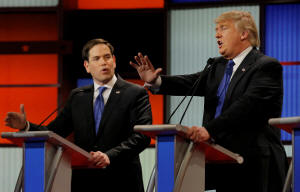'Trump Too Small' T-shirt slogan turns into US Supreme Court battle
 Send a link to a friend
Send a link to a friend
 [October 27, 2023]
By Blake Brittain [October 27, 2023]
By Blake Brittain
WASHINGTON (Reuters) - "Trump Too Small" - a phrase mocking former
President Donald Trump that a California lawyer intended to slap on
T-shirts - instead has become the center of another U.S. Supreme Court
battle exploring the intersection of trademark law and free speech
rights.
The justices are set to hear arguments on Wednesday in the U.S. Patent
and Trademark Office's appeal of a lower court's decision that reversed
the agency's denial of attorney Steve Elster's 2018 trademark
application for "Trump Too Small." At issue is whether the U.S.
Constitution's First Amendment free speech protections for criticism of
public figures outweigh the agency's concerns over Trump's rights, as
the lower court found.
The agency will try to convince the justices to uphold a 1946 federal
law that bars trademarks featuring a person's name without consent.
President Joe Biden's administration is seeking to protect Trump - the
man he defeated in the 2020 U.S. election - from, in its view, having
his name misappropriated in commerce. Trump is not personally involved
in the case.
Elster has argued that a ruling favoring the government would give
politicians improper control over speech about them. The agency, on the
other hand, has said that trademarks like Elster's could restrict the
free speech of others on political matters by giving legal ownership of
certain words to specific people.

Trademarks protect identifiers of sources of goods, like brand names,
logos and advertising slogans.
The Supreme Court in recent years has struck down two trademark laws
based on free speech concerns. It ruled in favor of Asian-American rock
band The Slants in 2017 against a ban on trademarks that "disparage,"
and in favor of artist Erik Brunetti against a prohibition on "immoral"
or "scandalous" marks in a dispute over his "FUCT" brand in 2019.
Elster applied for the "Trump Too Small" trademark to use on T-shirts,
inspired by an exchange between Trump and U.S. Senator Marco Rubio
during a March 2016 Republican presidential candidate debate.
Trump earlier sought to denigrate Rubio by calling him "Little Marco."
Rubio responded at a campaign rally in Virginia that his rival had
disproportionately small hands. Trump defended the size of his hands at
the debate.
"Look at those hands. Are they small hands?" Trump asked. "If they're
small, something else must be small. I guarantee you, there's no
problem. I guarantee it."
Elster told the Supreme Court that his trademark uses a double meaning
to criticize Trump while expressing his views about "the smallness of
Donald Trump's overall approach to governing." Trump was president at
the time of Elster's application.

[to top of second column]
|

Republican U.S. presidential candidate Marco Rubio and rival
candidate Donald Trump (R) speak simultaneously at the U.S.
Republican presidential candidates debate in Detroit, Michigan,
March 3, 2016. REUTERS/Jim Young/File Photo

The agency denied the application based on the 1946 law. The U.S.
Court of Appeals for the Federal Circuit later reversed that
decision.
'I STUMP FOR TRUMP'
U.S. Solicitor General Elizabeth Prelogar, representing Biden's
administration, told the Supreme Court in a brief that the 1946 law
differed from the two that the justices recently invalidated because
it did not restrict speech based on an applicant's viewpoint.
The trademark office said that the law is meant to prevent a
person's name from "being exploited for another's commercial gain,"
and has been used to reject trademarks with positive connotations
("Better With Biden," "I Stump For Trump") and neutral ones ("Obama
Pajama," "Royal Kate") in addition to critical messages.
"To give Elster a (trademark) registration, I don't think it really
enhances in any way his right to speak," said Jonathan Moskin, a
partner at law firm Foley & Lardner who wrote a brief supporting the
agency on behalf of the International Trademark Association, which
represents various trademark owners. "He can put his slogan anywhere
he wants - whether or not he gets a registration."
Moskin also said that a Supreme Court trademark decision from June -
in which the justices ruled in favor of Jack Daniel's in a dispute
over dog toys that parodied its famous whiskey bottles - may have
"pulled back a little bit" from the Slants and Brunetti precedents.
Elster in a brief to the court wrote that the 1946 law "effectively
precludes the registration of any mark that criticizes public
figures - even as it allows them to register their own positive
messages about themselves." Elster noted that "Joe 2020" and
"Hillary For America" were registered, but "No Joe in 2024" and
"Hillary for Prison 2016" were rejected under the law.

Golden Gate University School of Law professor Samuel Ernst, who
wrote a court brief supporting Elster, said a win for the government
would create a "heckler's veto" for politicians who want to prevent
trademarks criticizing them. Ernst also said the law at issue does
not further the overarching trademark law goal of preventing
marketplace confusion.
"Nobody would be confused into believing that Donald Trump is
selling T-shirts accusing him of being too small," Ernst said.
(Reporting by Blake Brittain in Washington; Editing by Will Dunham)
[© 2023 Thomson Reuters. All rights
reserved.]This material
may not be published, broadcast, rewritten or redistributed.
Thompson Reuters is solely responsible for this content. |